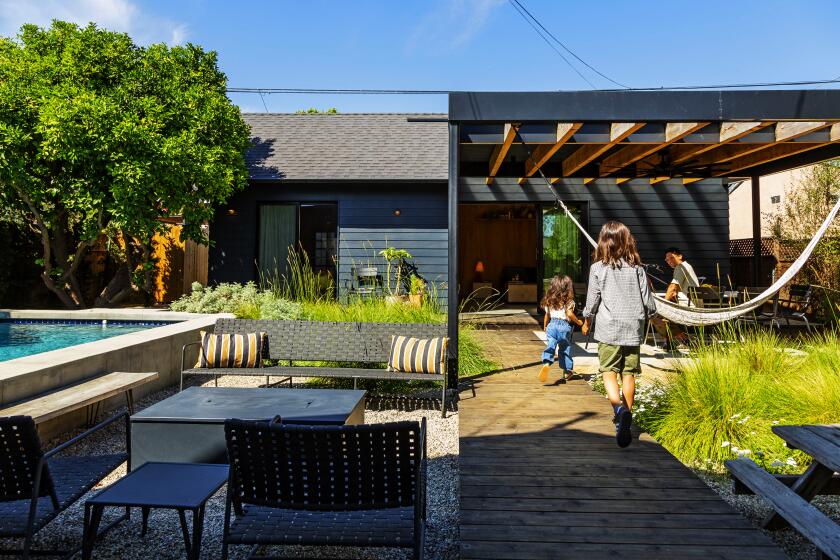Historical Society Vows to Continue Battle to Protect Goode House
- Share via
Despite widespread criticism from city leaders, members of the Glendale Historical Society say they are doggedly continuing their fight against a plan to build a senior citizen apartment complex around the historic Goode House.
David L. Smith, society president, said this week that the group will appeal a decision issued last week granting a variance and conditional-use permit to convert the 101-year-old Victorian house into a commercial office and build a horseshoe-shaped apartment building around it.
The appeal, which must be filed by Nov. 17, would be heard by the Board of Zoning Appeals. Smith said the group is prepared to carry the challenge back to a previously unsympathetic City Council and may seek legal action in the event of rejection.
Council members have chastised society leaders for challenging a private developer’s efforts to preserve Goode House, considered one of the most valuable historical landmarks in Glendale. City officials have been hoping for years to save the house, which sits in the center of a three-lot parcel at 119 N. Cedar St.
The house had been threatened with demolition until the city in 1985 adopted an ordinance protecting historic places. However, the house still could be demolished if the owner filed for a permit and no other buyer could be found within a year.
Smith said members are continuing their opposition to the preservation plan because they fear that the approved proposal may disqualify the house from eligibility for the National Register of Historic Places. He said the proposed 40-unit apartment building, which would come within 8 feet of the house, is too close and too large and would impair views of architectural features. “The project smothers the house,” Smith said.
Planning Director John W. McKenna granted the variance Nov. 2 with a series of conditions after months of negotiations involving the developer, preservationists and city officials.
The developer, Joe Ayvazi of the Cedar Broadway Partnership of Glendale, said the density of the apartment development, which consists of undersized units, is needed to make the restoration project financially feasible.
Ayvazi’s proposal is currently the only alternative offered to save the house, which is the last example of Queen Anne-Eastlake architecture on its original site in Glendale.
Marlene Roth, a consultant to the developer, said a series of changes were made in the proposal in response to criticism from preservationists and city officials. Concessions have included a significant increase in the distance the apartment building will be set back from the street so as not to overshadow Goode House.
Roth said any further concessions to the demands of preservationists would render the project financially infeasible. She said restoration of the house is expected to cost $250,000 to $300,000. Cost of the entire project is estimated at more than $2.6 million.
Concessions Granted
In response to Ayvazi’s pledge to restore Goode House and provide much-needed senior housing, the city also has granted a number of concessions in its zoning standards. The city code normally would permit construction of only 30 units on the three-lot parcel, and the individual units would have to be larger than those planned by Ayvazi. City officials also have agreed to permit smaller side and rear yards and fewer parking spaces.
But Smith and some other society members say the concessions have gone too far. He said an integral part of the house is its “residential Southern California landscaping that has been obliterated by this plan.”
Earlier Pleas Rejected
The City Council in August twice rejected pleas from the society and its legal and architectural preservation experts to require environmental impact studies and changes in Ayvazi’s plans. Historical Society members insist that the project should be directed by the state Office of Historic Preservation.
However, city officials then said they have no intention of relinquishing local control and so warned critics of the restoration project. Mayor Carl Raggio and other council members accused a small group of Historical Society members of attempting to sabotage plans to salvage the house, which was the home of E. D. Goode, a pioneer city founder.
“We have reviewed this time and time again,” said Raggio, who later told society members that “implied threats have come from you and your organization.”
Council members said they are more concerned about saving the historic structure than listing it on a national roster.
More to Read
Sign up for Essential California
The most important California stories and recommendations in your inbox every morning.
You may occasionally receive promotional content from the Los Angeles Times.










